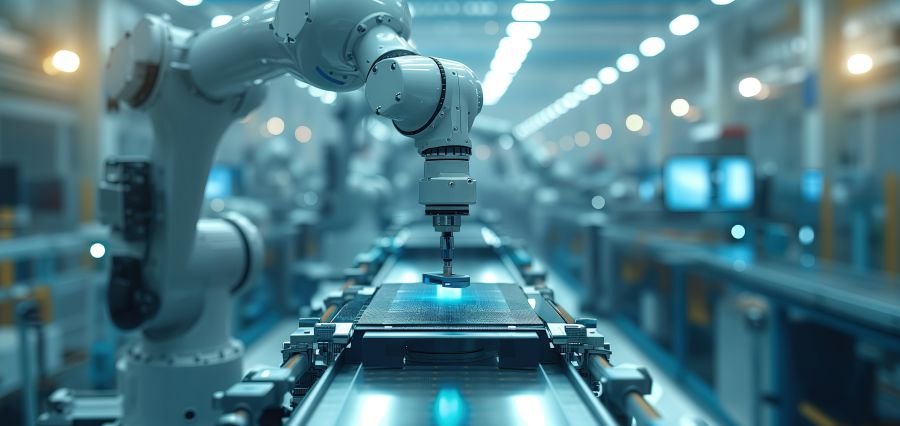The dawn of the Fourth Industrial Revolution, commonly known as Industry 4.0, is transforming the manufacturing landscape with unprecedented speed and innovation. Characterized by the convergence of digital technologies, Industry 4.0 is revolutionizing how manufacturers design, produce, and deliver products. By integrating advanced technologies such as the Internet of Things (IoT), artificial intelligence (AI), big data analytics, and robotics, Industry 4.0 is not just a technological shift but a comprehensive reimagining of manufacturing processes.
The Pillars of Industry 4.0
At the heart of Industry 4.0 are several key technologies that work in tandem to create a highly interconnected and intelligent manufacturing environment.
- Internet of Things (IoT)
IoT connects machines, systems, and products, enabling real-time data collection and communication. This interconnectedness allows for smarter and more efficient operations, where machines can self-monitor and even predict maintenance needs before issues arise. The result is reduced downtime and increased productivity.
- Artificial Intelligence (AI) and Machine Learning
AI and machine learning algorithms analyze vast amounts of data generated by IoT devices. These technologies enable predictive maintenance, optimize supply chains, and improve quality control. AI-powered systems can identify patterns and anomalies that human eyes might miss, leading to more accurate and timely decision-making.
- Big Data Analytics
The massive influx of data from IoT devices and other sources is harnessed through big data analytics. This allows manufacturers to gain deep insights into their operations, from production line performance to customer preferences. These insights drive efficiency improvements, cost reductions, and innovation.
- Robotics and Automation
Advanced robotics and automation are at the forefront of Industry 4.0. Robots equipped with AI can perform complex tasks with precision and consistency, significantly enhancing production capabilities. Collaborative robots, or cobots, work alongside human operators, combining human dexterity and intelligence with robotic efficiency and strength.
Transforming the Manufacturing Process
The integration of these technologies is revolutionizing every aspect of manufacturing, from design and production to logistics and customer engagement.
- Smart Factories
Smart factories epitomize the Industry 4.0 vision. In these highly automated environments, machines, and systems communicate seamlessly, adapting to changes in real-time. This adaptability leads to greater flexibility, allowing manufacturers to quickly switch between product lines and customize products to meet specific customer demands.
- Predictive Maintenance
Traditional maintenance schedules are often based on fixed intervals, leading to either over-maintenance or unexpected breakdowns. Industry 4.0 introduces predictive maintenance, where IoT sensors and AI algorithms predict when equipment will fail. This proactive approach minimizes downtime and extends the lifespan of machinery, resulting in substantial cost savings.
- Supply Chain Optimization
Industry 4.0 enables end-to-end visibility across the supply chain. Real-time data from suppliers, manufacturers, and distributors allow for dynamic adjustments to production schedules and inventory levels. This level of transparency and agility helps mitigate risks, reduce lead times, and enhance customer satisfaction.
- Enhanced Quality Control
With AI-driven quality control systems, manufacturers can achieve near-zero defects. High-resolution cameras and sensors monitor every stage of production, identifying defects at a granular level. Machine learning algorithms continuously improve their accuracy, ensuring that only the highest quality products reach the market.
The Human Element in Industry 4.0
While technology is at the core of Industry 4.0, the human element remains crucial. The transformation of manufacturing processes necessitates a skilled workforce capable of managing and leveraging these advanced technologies. This shift emphasizes the importance of upskilling and reskilling workers to thrive in a digital manufacturing environment.
Challenges and Considerations
The adoption of Industry 4.0 is not without challenges. Cybersecurity is a significant concern, as the increased connectivity of devices opens up new vulnerabilities. Ensuring robust cybersecurity measures is essential to protect sensitive data and maintain operational integrity.
Additionally, the initial investment in Industry 4.0 technologies can be substantial. However, the long-term benefits in terms of efficiency, productivity, and cost savings often justify the upfront costs. Manufacturers must carefully assess their readiness and develop a strategic roadmap for implementation.
The Future of Manufacturing
Industry 4.0 is not a destination but a continuous journey of innovation and improvement. As technologies evolve and become more integrated, the potential for further transformation in manufacturing is immense. The future will likely see even greater levels of automation, intelligence, and customization, driven by advancements in AI, quantum computing, and nanotechnology.
In conclusion, Industry 4.0 is revolutionizing manufacturing by creating smarter, more efficient, and highly adaptable production environments. By embracing these technologies, manufacturers can achieve unprecedented levels of productivity, quality, and customer satisfaction. The Fourth Industrial Revolution is not just reshaping manufacturing; it is redefining the very fabric of industry and society, heralding a new era of possibilities.

